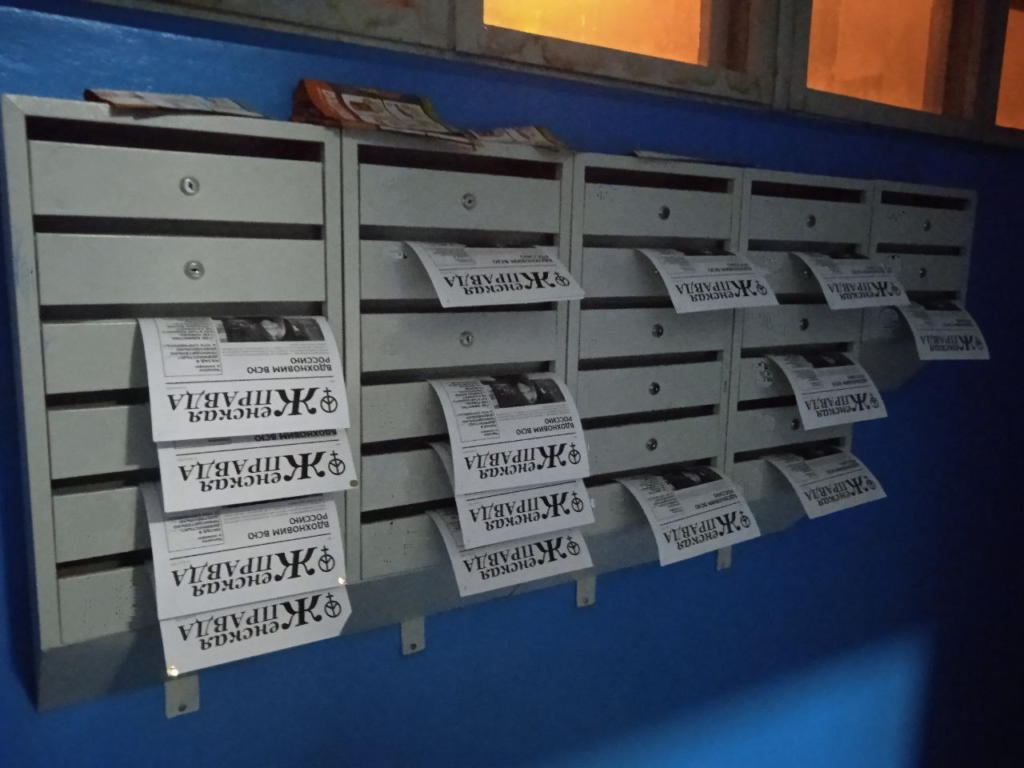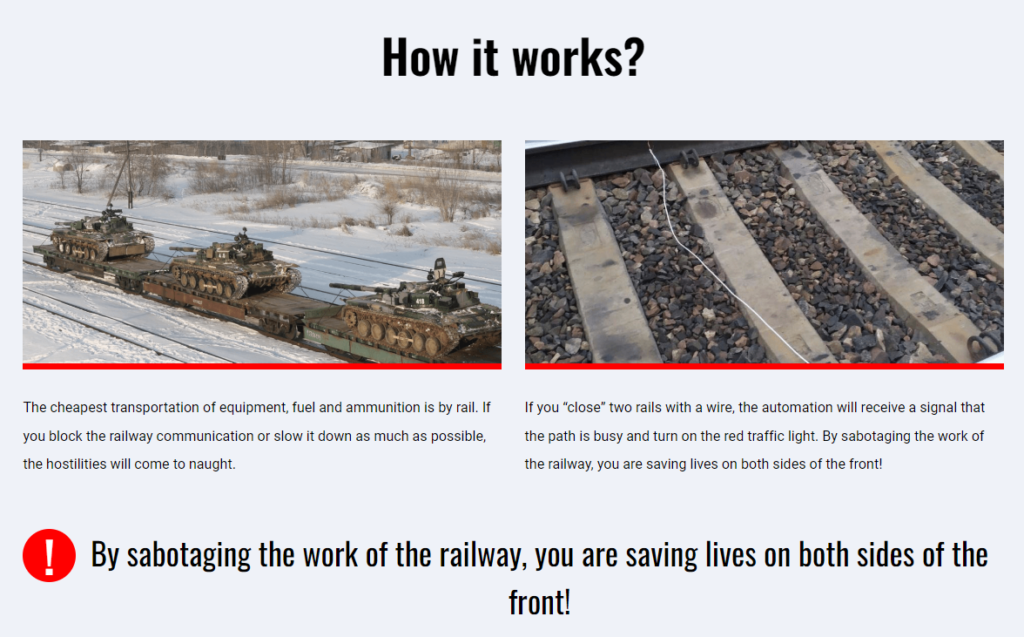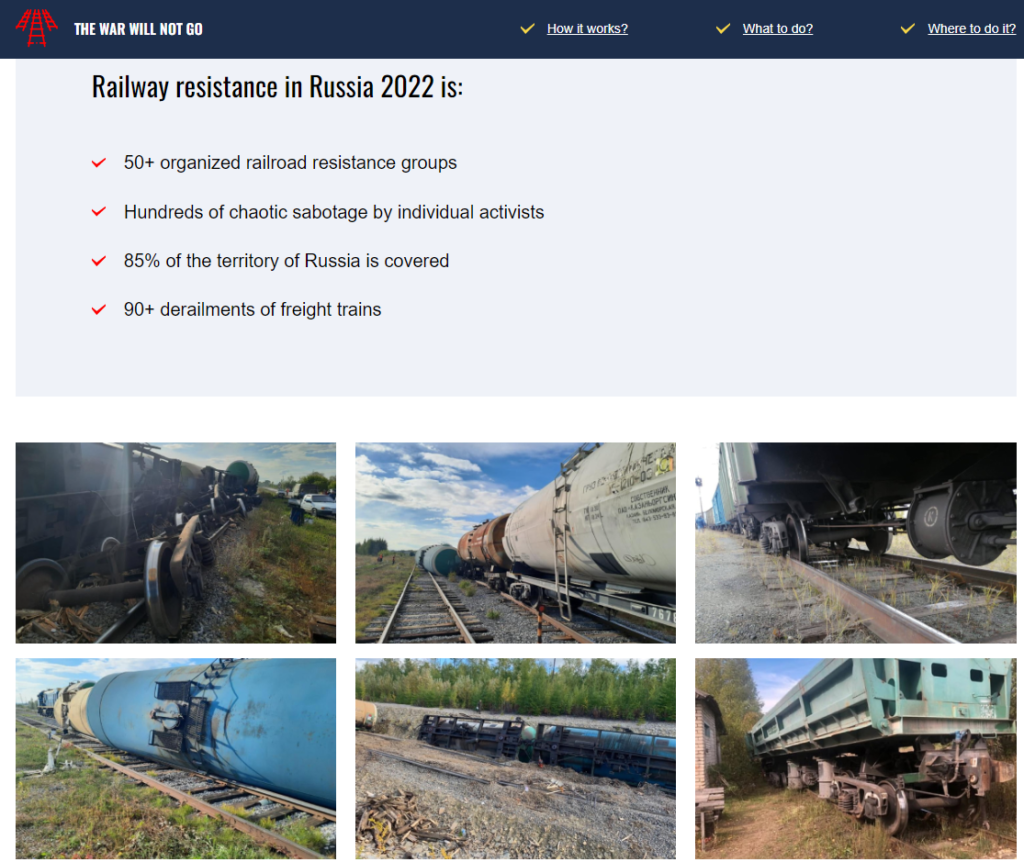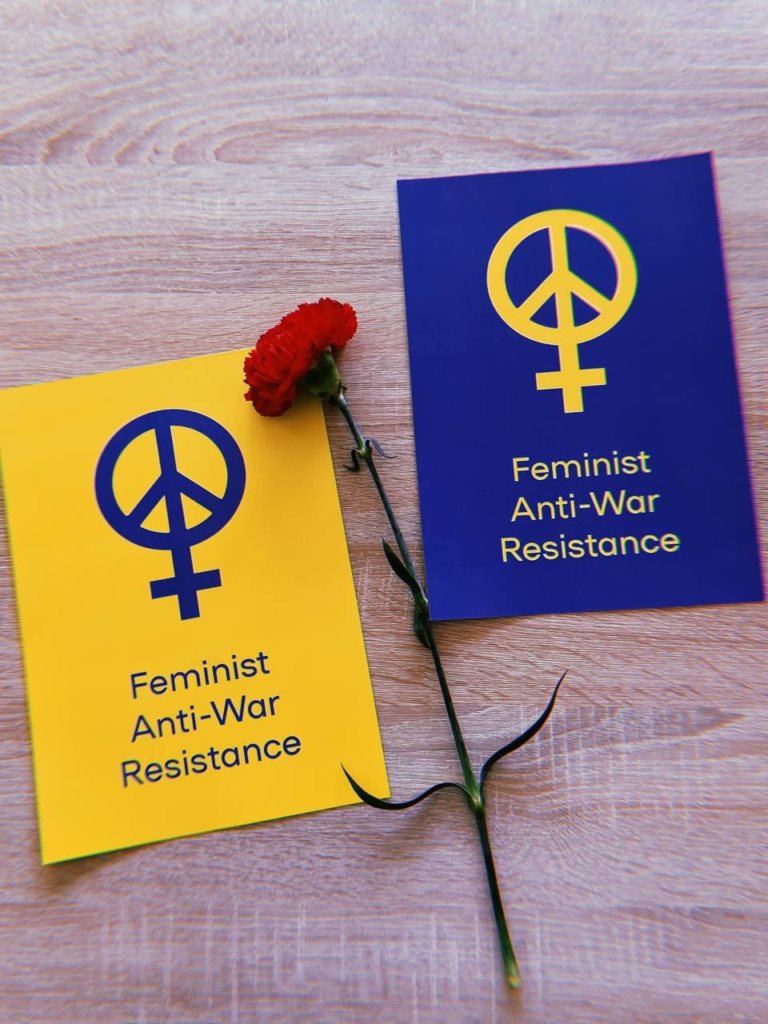(Šis tekstas – anglų kalba. Jis jau verčiamas į lietuvių ir lietuviškai mūsų portale pasirodys netrukus)
Lolja Nordic is from St. Petersburg and is a coordinator of the Feminist Antiwar Resistance movement in Russia, a member of the feminist activists group called “The *8-th Initiative Group” and a co-organiser of a charity music festival called “Not Her Fault”, which supports domestic violence survivors. Lolja spoke at the Kombinatas festival in August. You can listen to her talk on our Youtube channel here. In this interview, we talked about the scarcely covered anti-war resistance in Russia.

Anti-war protests in Russia at the start of the war were quite widely covered but in recent months there has been barely any coverage. One could easily think that resistance died out in Russia. Could you tell us about how the resistance started and what is going on today?
I was anti-war for many years. When the war in Ukraine started in 2014, I was against it and I was against the annexation of Crimea, taking part in some street protests that happened back then against war in Ukraine. But somehow back then, a large antiwar movement wasn’t evolving. Maybe because the annexation of Crimea wasn’t that violent, it happened really quickly and there was no bloodshed. Also, the protests were suppressed by the government. As always.
In February, when the war escalated, a lot of people got mobilized in Russia, started doing protests and I joined them too. By that time, I couldn’t take part in street protests because I had had a series of arrests. It was very risky for me to go out on the street, as I could have gotten a really serious criminal case for violating the same laws on illegal protesting several times in a row. I was coordinating protests online and I was helping people who got arrested, trying to connect them with lawyers and with their relatives, coordinating this kind of background work. We had really large protests all over Russia in many cities during the first several weeks after Putin invaded Ukraine again.
Like the article? Support us here:
It was really brave, I guess, of the people who took part because by that time, people already knew what they would face. It was clear that if you joined, you would get beaten by the police, you would get arrested, or at least have a large fine to pay. Regardless, people were going out. Even though they saw their friends and their relatives being arrested, they still were going out every day.
There were daily protests for several weeks. But then it slowed down a bit, because thousands of people got arrested, and a lot of people got in jail for a month or more. Some new laws were passed by Putin’s bandits to make it almost impossible to protest the war. Right now, even posting the word “war” can get you in jail.
When the war escalated, I and several other feminist activists from different cities, like Daria Serenko, Ella Rossman and others whose names I cannot disclose for safety reasons, talked to each other and decided we should gather all our feminist groups, resources and our skills to oppose this war. That’s how Feminist Antiwar Resistance started. First we made a secret group chat and said, what should we do? We decided that we wanted to make a horizontal network, do street actions, protests, online agitation and everything we could.
How has the Resistance changed since then?
After several first weeks, it was clear that street protests don’t work because we don’t live in a democratic state. We live in an authoritarian state which is turning into a military dictatorship right now. So after we had 16,000 people arrested all over Russia, it was clear that Putin didn’t care how many people would go out on the street. Yet every week, I still see somebody detained for an anti-war sign or a one-person street protest. It’s more like a cry of desperation, I guess, because sometimes people just can’t stand what’s happening and, even though they know that they will get arrested or charged, they still go and do it. Also, we had a lot of people protesting in the street after the mobilization was declared, but all these protests were also brutally suppressed by the police.
There are more sustainable ways of protest, we don’t want anti-war activists in jail, we don’t want them detained. We need them active in the underground partisan movement. The main point of the anti-war movement inside Russia right now is to push away the moment when you get arrested as much as possible, so as to stay free and active, using other strategies than going to street protests openly.

What kind of activism is being done by groups like the Feminist Antiwar Resistance?
We grow very fast and by now we have several equal directions of our work. Our social media accounts are working as daily anti-war online media to break the Kremlin’s propaganda, at the same time we are running a DIY anti-war newspaper that people can print out at home and secretly distribute in their cities in Russia. We organized a free hotline to provide free psychological help to those who were affected by political repressions and police brutality and started support groups for mothers of the soldiers who were forcibly mobilized to war.
Our activists are spreading information on how to escape mobilization and how to bring back and save those who have already been mobilized. We help antiwar activists whose lives are in danger to temporarily evacuate from Russia and find shelter for them. Together with two anarchist organizations, we started an Anti-Fund – a project to legally support workers in Russia who got fired or are threatened to be fired for their anti-war positions or activism. We collaborate with decolonial anti-war movements inside Russia run by ethnic minorities and indigenous peoples, for example, Free Buryatia Foundation.
Our volunteers and activists also help Ukrainian refugees, we have hundreds of thousands of them in Russia right now. They were kidnapped by the Russian military and violently brought from the occupied zones to Russia. Now they need help to get out of Russia, because no Ukrainian is safe here. The authorities want to manipulate these people into becoming Russian citizens and rejecting their Ukrainian passports, so the government can later say: “Look. We are so good. We saved these people from the war zone.” Which is bullshit, of course, because they don’t take care of them at all. These people are living in terrible conditions, in old hotels, old schools or kindergartens or some other abandoned places.
All of the help that they get, the real and effective help, they get from volunteers, grassroot networking groups and NGOs. They’re trying to organize their trips to Europe or back to Ukraine from these places which are all over Russia. The government is not interested in placing these people in big cities. They want to put them in tiny villages, so that it would be super hard for them to get out. Imagine: you are somewhere in the suburbs, in Siberia, and to get out of the country, you need to make this huge trip through the whole country, to get to St. Petersburg, to Moscow, to be able to go abroad.

What other kinds of anti-war resistance are happening now in Russia?
So what was possible to do after everybody realized that it was not possible to do street protests? We had to create a different, anonymous and more partisan kind of resistance. For example, by now we have hundreds of cases of secret anarchist partisan groups trying to slow the railways which transport military machines to the war zone and setting on fire military conscription offices.
It’s a secret network, very anonymous, very protected. These people are breaking railways, and the government tries to ignore it completely, because in the official news you only hear that “oh, something bad happened to a railway, something broke down by itself. We don’t know what happened.” But we see that there are 100 more cases like that.
Also, we have Telegram channels (Боец Анархист and Stop the Wagons) where these partisans are showing how they did it and posting the reports of where they did what. This is a real partisan movement which does something serious, which is effective because it really slows down the war effort.
Lots of people who are at risk of being mobilised protest and sabotage it. Thousands of people have fled the country not to get mobilized, some are hiding inside and some who got mobilized against their will try to partake in sabotage inside the training camps. Moreover, the mothers of mobilized soldiers are starting to organize and put pressure on official institutions to show their anger and bring back home their close ones.

Except for a couple of articles in Western news outlets, these partisan actions seem underreported. How are they being covered in Russia?
They’re just making it look like it’s not people who broke these railways. They are making it look like some technical issues. One of the biggest victories of this partisan movement was when they completely paralyzed the Trans-Siberian Railway. This is a major and well-known railway route which goes across all of Russia, all of Siberia, and they paralyzed this major route for several days, which was really great.
State media just make it look like nothing is happening because they want it to seem like they have it under control. So even though the secret police know about the partisans, it’s really hard to catch them.We have had many cases of these railway sabotages and nobody actually got hurt. I think it’s really important, too. There are also cases where these partisans set fire to military offices where young soldiers have to get their documents for temporary service, the military, or the war zone. This also stops and slows down the military system.
At the same time, there are still people who are trying to break this military censorship that we have right now in Russia. All independent media is blocked right now for Russian citizens. Not everybody is using VPN, therefore a lot of people get isolated from the real news and from independent media. A lot of activists are doing some DIY media like we do with our anti-war newspaper.
We have been running this paper for several months now and people print it in their homes so it’s completely DIY. They just download the file that we provide, they print it and they distribute it in their households and their neighborhoods secretly. That way people who are not used to the internet can read it and get access to information.
It’s kind of a parody, it’s called “Zhenskaya pravda”, which means “Women’s truth”. We make the text look like it’s just entertainment. We have a horoscope there in the background. We have a crossword on one page. We have some cheesy, silly headlines and stuff. It really looks like it’s something light, but when you go through the text, you get real information about the war, about the violence, about how Ukrainian people are struggling, how different workers are affected by the war and what we can do about it.
At the same time, we have millions of people doing graffiti anti-war signs and putting stickers with QR codes all over the place. You can scan this QR code and get access to independent news channels. This is a really big part of the work, too.
Why do you think there is so little reporting on Russian resistance? Is it a lack of contacts with movements in Russia?
I think there are several reasons. Of course, there is a lack of connection, but at the same time, I think there is a problem about stereotypes and a problem with the media industry and how media works. Everybody wants to see brave people out on the streets fighting the police with Molotov cocktails and getting arrested. I think most of the media, when they think about the resistance and anti-war movement, they want to see this kind of emotional picture.
What many people may not realize is that street protests are not the only form of resistance. Sometimes things are more complicated and sometimes you need to do a lot of routine and invisible work. I think working with the refugees is this kind of routine, invisible, hard work that you have to do every day. There was a lot of fuss in the media in spring about helping the refugees, but right now they’re not interested anymore because the refugee crisis has been going on for over half a year.
What can you tell us about the effect of Western sanctions on Russia?
I think that the most important sanction by European countries is the embargo on fossil fuels, oil, coal and gas from Putin. I think this embargo is a demilitarization tool because whenever European countries buy fossil fuels from Russia, the money goes straight to Putin’s pocket and the elite, who are using it for the war in Ukraine. Buying gas and fossil fuels from Russia means financing the war, financing the militarization of Russia. These are just facts. I think we should be putting some light on it all the time because sometimes European politicians are trying to separate these two things. I think we have to call them out and make this connection clear.
At the same time, I think it’s really important to call out European populists who want to ban all Russian people from entering European countries. It is a really stupid idea which affects a lot of people from vulnerable groups who can only get a tourist visa, but not those who are in charge of this war and who have been supporting Putin’s regime for years.
A good example that I can share is the list made by the Navalny team. It is a list of 6000 people who are in charge and who are responsible for the crimes of Putin’s regime. These are the people who need to be sanctioned. Many of them don’t really need tourist visas to get into Europe because they have property or some kind of businesses in Europe and have other ways to get out of the country.
Meanwhile, there are people who are hostages of Putin’s regime, who aren’t rich and are saving money for a couple of years to be able to leave the country, to be able to see the outside world and to experience something other than Putin’s government and Putin’s state.
The travel ban will affect antiwar activists and their families. It’s really important to understand that a lot of activists are not seeking political asylum, because the political asylum procedure is a bureaucratic hell, and it leaves you without mobility. It leaves you drowned in the papers, in bureaucracy procedures. So the mobility issue that I’m talking about is a really important issue of the anti-war resistance movement because some activists are already abroad, and they can’t go back to Russia because the second they go back, they will go to jail for several years. I need to be able to connect with people who are working in Russia right now and not planning to leave. We need simple visas so that these people can leave Russia for a couple of weeks or months, to meet their relocated comrades and then go back to continue their work.
At the same time, there are more personal and intimate issues. For example, I don’t know when I’m going to see my friends who are not political activists. Nobody will give them political asylum or humanitarian visas because they’re not activists. They’re just ordinary people, workers, but they are my family. Our only chance to meet was for them to get a tourist visa and come to see me for a weekend. But now it is impossible because the borders of the Baltic countries are closed for Russians with tourist visas. I don’t know when and where I will see my close ones.
I think these all the intersectional things and these more human and tiny things are completely invisible to these populist politicians who are throwing their statements about, oh, we should block every Russian because they’re all responsible. No, the world is more complicated than that. Life and reality is more complicated than that.

What can people do to help the resistance?
You should speak up about the diversity of the antiwar resistance in Russia, share information about it, confront those politicians, media and those who say that there is no resistance in Russia and that ordinary Russian citizens have to be sanctioned and blocked from entering other countries. You can also support anti-war projects with donations. Several links below, but there are many more:
Free Buryatia Foundation https://freeburyatia.org/
Organization of Soldier’s mothers against the war https://soldiersmothers.ru/donate
OVD-info – free legal help for detained and arrested people in Russia https://donate.ovd.legal/
Project «Идите лесом» (“Go through the forests”) – free help to those who want to escape mobilization https://inlnk.ru/XOMj2M
Anti-Fund https://www.antiwarfund.com/
Cover photo: courtesy of Feminist Anti-War Resistance
Taip pat skaitykite
-
The Interview: How to Occupy a University? The pro-Palestine Student Occupation of Ljubljana University
-
“In Slovakia the whole process is the same as in Hungary and Poland, but like on steroids, it’s much faster”. Interview with Tomáš Hučko
-
„ChatGPB and a half“: Qassem from Gaza – „You don’t destroy political thought by weapons”
-
Challenges of healthcare reform in Ukraine: on workers’ perspectives and struggles
-
Ian Parker: The Psy Professions, Pathology and Alternatives

